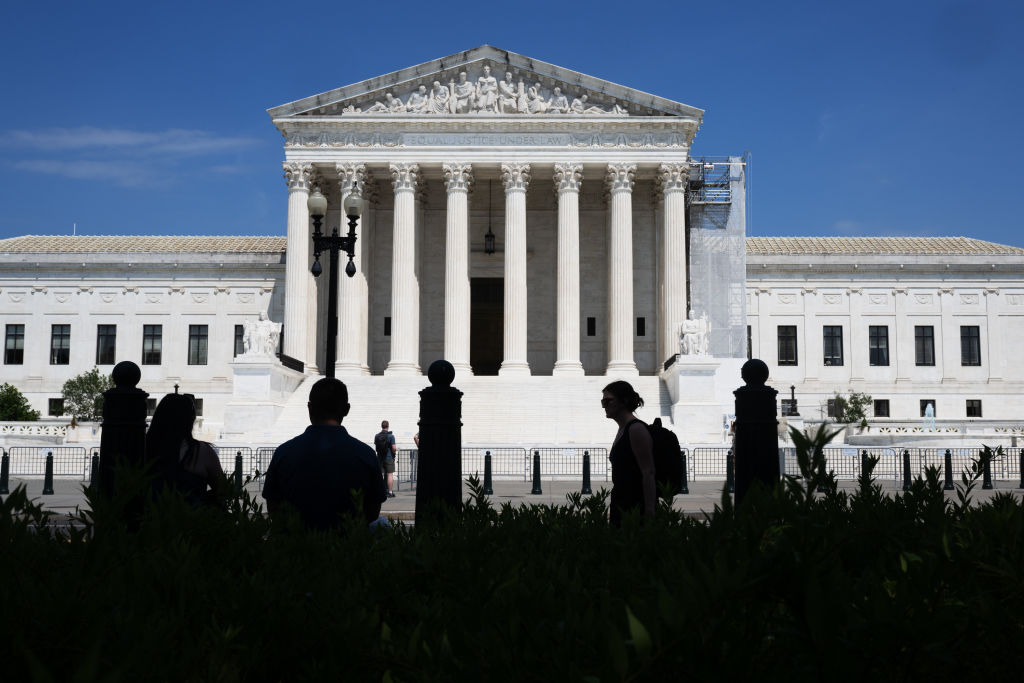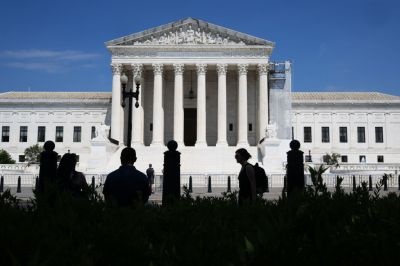When the Supreme Court begins its new term in the fall, it will hear arguments in U.S. v. Skrmetti, a federal government challenge of a Tennessee law restricting the use of puberty blockers and hormone therapy for treating gender dysphoria in minors. The court will decide whether the equal protection clause of the 14th Amendment prohibits states from enacting such legislation. Many other states have enacted similar laws, and this case will determine in large part whether they remain on the books.
Last March, the Tennessee Legislature enacted S.B. 1, which prohibits medical providers from providing puberty blockers and hormone therapy for minors using the treatments “to identify with, or live as, a purported identity inconsistent with the minor’s sex.” The law also prohibits surgical procedures for that purpose, but that portion of the law was not challenged in this case. The law imposes a penalty of $25,000 per violation, professional discipline, and potential civil liability.
What treatments are in question?
According to KFF, a nonpartisan health policy nonprofit organization, 25 states have enacted legislation or policies limiting minors’ access to what KFF describes as “gender-affirming care”—a “spectrum of ‘medical, surgical, mental health, and non-medical services for transgender and nonbinary people’ aimed at affirming and supporting an individual’s gender identity.” Treatments like puberty blockers, hormone therapy, and surgery are intended to align patients’ primary sex characteristics (sex organs) and secondary sex characteristics (such as voice, body and facial hair, and breast development) with their preferred gender identities.
Puberty blockers are drugs that “pause” puberty by preventing the body’s natural production of sex hormones (testosterone in males and estrogen in females). Some people use the drugs to prevent undesired secondary sex characteristics such as facial hair growth in men and menstruation in women. They can also be used to treat precocious puberty (when puberty starts at a very early age) and prostate and breast cancer. If used long-term, these drugs can negatively affect bone density and fertility.
Hormone therapy refers to treatments that affect the production of certain hormones, commonly used to treat menopause symptoms and certain cancers. In gender-transition treatment, patients use cross-sex hormones to induce desired secondary sex characteristics. Used in combination—with or without surgery—puberty blockers and hormone therapy start to align a transgender person’s physical characteristics and preferred gender identity.
What is the relevant law?
Two primary questions will determine the fate of the Tennessee law. First, the Supreme Court must decide what level of scrutiny applies. Second, it must determine whether the law meets that standard.
When evaluating a statute’s constitutionality, courts generally apply rational-basis review. That means the law is constitutional as long as a legislature had some rational basis for enacting the law. It doesn’t need to be the best—or even a good—reason, and it doesn’t matter if the legislature could have written a better law. This is a low bar, and Tennessee’s law likely clears it. (The 6th U.S. Circuit Court of Appeals agreed.)
But statutes that classify people based on certain characteristics are subject to heightened scrutiny, due to the 14th Amendment’s equal protection clause, which prohibits a state from “deny[ing] to any person within its jurisdiction the equal protection of the laws.” Laws that discriminate on the basis of race or religion are subject to strict scrutiny—the most stringent standard. Courts apply “intermediate scrutiny” to laws that discriminate on the basis of sex. Under intermediate scrutiny, a law is constitutional if it furthers an important governmental interest and employs means that are substantially related to achieving those objectives. The federal district court that originally heard the complaint applied this standard and blocked the law.
How did this case get to the Supreme Court?
After the bill became law in March 2023, three transgender minors, their parents, and a doctor sued Tennessee Attorney General Jonathan Skrmetti to prevent the law from taking effect. They claimed the law discriminated on the basis of sex, violating the equal protection clause. The plaintiffs also claimed the law violated the due process clause of the 14th Amendment, but that question is not part of the Supreme Court case. The Biden administration intervened in (joined) the lawsuit, which federal law authorizes in 14th Amendment equal protection cases.
Tennessee argued its legislature had a more than sufficient basis for enacting the law and that it acted to protect minors and the integrity of the medical profession. It cited controversy surrounding a transgender clinic at Vanderbilt University Medical Center (VUMC), which had performed gender-transition treatments on minors. Tennessee asserted that VUMC doctors knew the procedures lacked data on short-term effectiveness and had unknown long-term effects. The state also claimed VUMC doctors pursued these treatments due to their profitability and changed patient diagnoses when insurance companies refused to pay large bills.
The U.S. District Court for the Middle District of Tennessee blocked S.B. 1 from taking effect last June. Because the law discriminates on the basis of sex and transgender status, the court reasoned, intermediate scrutiny applies. The judge weighed the parties’ evidence and expert testimony and determined that Tennessee had not established that the prohibited treatments posed a serious risk to the minors undergoing the treatments, and the categorical ban on treatments was not sufficiently related to the state’s interest in protecting minors. Tennessee, having failed to establish that the law served an important government interest by substantially related means, sought appellate review.
In the fall, the 6th Circuit overturned the lower court’s injunction by a 2-1 vote and allowed the law to take effect. The court rejected the notion that transgender status is a protected class under the equal protection clause or that the law discriminated on the basis of sex. It reasoned that the law regulates sex transition treatments for all minors, even if the particular treatments differ based on sex. Applying rational basis review, the court determined that the Tennessee Legislature had a rational basis for enacting the legislation. The Biden administration filed a certiorari petition in January, which the Supreme Court granted on June 24.
How will the Supreme Court analyze the case?
The applicable level of scrutiny will significantly influence the Supreme Court’s analysis. The court will apply rational-basis review unless it determines that transgender status is a protected class—it hasn’t recognized a new protected class in more than 40 years, according to the 6th Circuit Appeals Court—or unless it determines that the law discriminates on the basis of sex.
It’s not a straightforward question. At a high level, the law does not treat males and females differently—it prohibits all minors, regardless of sex, from receiving the specified treatments for gender-transition treatment. But the law does treat males and females differently in that it permits, for example, testosterone treatments for males and not females. A law triggers intermediate scrutiny only when it discriminates between “similarly situated” individuals. Tennessee claims that a biological female taking testosterone as part of gender-transition treatment and a biological male taking testosterone to supplement naturally low testosterone levels are not similarly situated, and, therefore, there is no sex-based discrimination.
The question may appear at first glance similar to the issue the Supreme Court tackled in Bostock v. Clayton County in 2020. In that case, the court held that, under Title VII of the Civil Rights Act of 1964, an employer could not fire employees due to their sexual orientation or gender identity. But there are important differences between Skrmetti and Bostock. The text of Title VII prohibits employers from “discriminat[ing] against any individual ... because of such individual’s race, color, religion, sex, or national origin.” The court’s decision, penned by Justice Neil Gorsuch, focused heavily on the ordinary public meaning of that statute. Constitutional interpretation is a little different than statutory interpretation. In Skrmetti, the court will interpret the much more vaguely worded equal protection clause. Rather than determining whether an action violated a statute, the court will have to determine how much authority the equal protection clause gives state governments to craft legislation.
What are the broader implications?
With so many states legislating in this area, the Supreme Court's decision in Skrmetti will have far-reaching consequences. A ruling affirming the law could relieve pressure on the 17 states that face legal challenges to their own similar legislation and could embolden other states to pass their own. Striking down the law could set a higher standard of scrutiny for laws affecting transgender individuals. It would send states back to the drawing board for finding ways to limit gender-transition treatment for minors in constitutionally acceptable ways. While some states might abandon or narrow their restrictions, others may consider broadening them—banning testosterone for both male and female minors, for example—to avoid heightened scrutiny. The heightened scrutiny would also apply to other areas of law. According to the Map Movement Project, a progressive think tank, 25 states restrict transgender youth participation in sports, and those laws may not withstand heightened scrutiny. As states continue to grapple with these difficult issues, Skrmetti will influence state legislation and the legal challenges that follow.






Please note that we at The Dispatch hold ourselves, our work, and our commenters to a higher standard than other places on the internet. We welcome comments that foster genuine debate or discussion—including comments critical of us or our work—but responses that include ad hominem attacks on fellow Dispatch members or are intended to stoke fear and anger may be moderated.
With your membership, you only have the ability to comment on The Morning Dispatch articles. Consider upgrading to join the conversation everywhere.